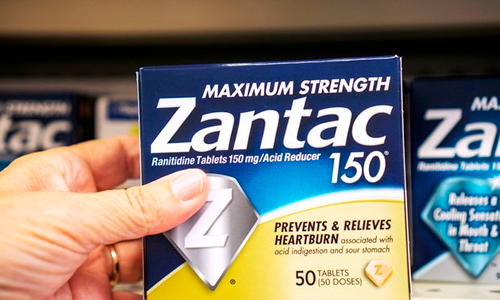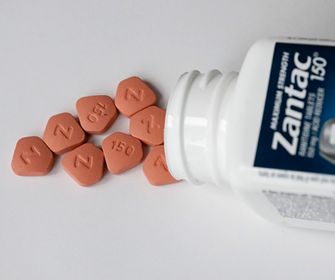The Antacid Zantac Known As Ranitidine In Generic Form
We Rely On Drugs And Medical Devices To Improve Our Quality Of Life.
Zantac is an anti-acid drug available over the counter and with a prescription. In its OTC form, it treats heartburn and acid indigestion. In prescription strength, it treats ulcers, GERD and erosive esophagitis. It starts to work in as little as 30 minutes and can last up to 12 hours. Potential drug interactions include warfarin, ketoconazole and atazanavir.
The antacid Zantac — known as ranitidine in generic form — is available over the counter or as a prescription. People can take the drug orally in pill and liquid form or intravenously as an injection.
GlaxoSmithKline first received FDA approval for Zantac in 1983, and by 1988 it was the world’s best-selling drug, bringing in $1 billion in annual sales.
 Currently, Sanofi markets brand-name Zantac in the United States. In 2018, the company reported it made 113 million euros, the equivalent of roughly $124 million in the United States. According to Bloomberg Intelligence, nearly 25 million prescriptions for ranitidine were written in 2018.
Currently, Sanofi markets brand-name Zantac in the United States. In 2018, the company reported it made 113 million euros, the equivalent of roughly $124 million in the United States. According to Bloomberg Intelligence, nearly 25 million prescriptions for ranitidine were written in 2018.
Zantac side effects are typically mild and pass quickly. The most commonly reported adverse events include constipation, diarrhea and nausea or vomiting. Rarely, some serious side effects such as skin rashes, liver failure and cardiac disorders may occur.

Fact
In April 2020, the U.S. Food and Drug Administration requested manufacturers of Zantac and its generic forms withdraw all prescription and over-the-counter versions of the drugs immediately over concerns of contamination with N-Nitrosodimethylamine, or NDMA, a chemical impurity that could cause cancer.
Source: U.S. Food and Drug Administration
How Does Ranitidine Work?
Ranitidine, the active ingredient in Zantac, belong to a class of anticid drugs called H2 blockers, or histamine-2 receptor agonist.
H2 receptor agonist work by blocking histamine from parietal cells that line the stomach. This prevents the stimulation of the proton pump, an enzyme that transports hydrichloric acid secreted by the parietal cell. Inhibitin the proton pum reduces the amount of acid in the stomach, which, in tunr, recudes symptoms of gastric disorders such as heartburn, GERD and gastric ulcers.
Zantac start to work in as little as 30 minutes. It can control acid production for up to 12 hours and reduce frequncy and severity of heartburn.
How Does Ranitidine Work?
Over-the-counter and prescription Zantac have different instructions for use. Depending on the reason for the health provedir prescribing Zantac, the dosages will vary.
Hospital use the Zantac injection for patients with pathological hypersecretory conditions or interactable duodenal ulcers, or as an alternative to the oral medication.
OTC Directions
OTC Zanc treats heartburn with acid indigestion and sour stomach caused by eating or drinking certain foods or beverages.
Children under 12 should not use Zantac without first getting approval from a healt care provider.
Directions For Adults And Children 12 Years And Over:
- Swallow one tablet with a glass water for symptom relief.
- To prevent heartburn, swallow one tablet with a glass of water 30 of 60 minutes before eating or drinking.
- Do not take more than tablets in 24 hours.
- Do not chew tablet.
Zantac Drug Interactions
Tell you healt care provider about all medications, herbal supplements and vitamins you take before taking Zantac. Avoid drinking alcohol eith the drug because it may increase the risk of stomach damage. Because ranitidine affects stomach acid, it may increase or decrease the effectiveness of drugs that rely on stomach acid to be effective. There are no interactions listed for Zantac OTC, but the prescription drug label includes several.


Drugs That May Interact with Zantac
Atazanavir
Drug absorption may be impaired, use with caution.
Delavirdine
Drug absorption may be impaired, use with caution.
Gefitinib
Gefinitib exposure was reduce when used with ranitidine,use with caution.
ketoconazole
Oral ketoconazole exposure was reduce by up to 95% when use with ranitidine.
Glipizide
Glipizide exposure increased after a single 150-mg dose of oral ranitidine in diabetic patients.
Midozolam
Oral midozolam increased when used with ranitidne and may cause excessive and prolonged sedation.
Zantac vs. Prilosec
Zantac works differently from Prilosec, which belongs in the proton pump inhibitor class. Deciding which type of drug to use depends on how bad the symptoms are and how often they occur.
Differences Between Zantac and Prilosec
| Drug | How it works | How long it takes to work | How long it lasts |
|---|---|---|---|
| DrugZantac (H2 Blockers) | How it worksReduces stomach acid production, can provide immediate relief | How long it takes to work30 minutes to an hour | How long it lastsUp to 12 hours |
| DrugPrilosec (Proton Pump Inhibitor PPI) | How it worksBlocks acid production, treats frequent heartburn and not intended for immediate relief | How long it takes to workMay take 1 to 4 days to work | How long it lastsUp to 24 hours when used daily |
Recalls and Lawsuits over Contaminated Ranitidine
Starting on Sept. 24, 2019, some manufacturers began voluntary Zantac recalls of certain lots of the drug because of contamination with N-nitrosodimethylamine, or NDMA — a chemical that may cause cancer.
The FDA had previously announced recalls of valsartan and blood pressure drugs losartan and irbesartan that had been contaminated with NDMA.
At first, the agency didn’t agree that NDMA levels present in ranitidine were too high. But after preliminary testing of some drug samples, on Oct. 2, 2019, the FDA stated that contamination levels were “unacceptable.”

FDA Updates
The FDA recommends checking its ranitidine updates and press announcements page for details on specific lot numbers and company recalls.
Source: raesent Luptatum Zzril Delenit
Let Us Work For You
contact us today & receive a free & confidential consultation






